Even in Ximending (西門町), where the progenitors of youth culture busy themselves finding fresh modes of expression, Pizza Cut Five (PCF) is something of a curiosity. The clothing company is disguised as a pizza joint, complete with peach refrigerated cabinets, piles of pizza boxes and a pink delivery scooter called A-fu (阿福)
The brand originated on the Net (www.pizzacutfive.com) three years ago as a concept-oriented fashion project paying tribute to Pizzicato Five, a Japanese pop group credited with leading Japan's Shibuya-kei movement (a genre the blends pop and electronica, named after the famous Tokyo district) of the 1990s.
Cleverly designed T-shirts are displayed in the fridge, sold in pizza boxes or delivered on the scooter. Though the presentation is appealing, the main advantage of the brand is its exclusivity: The made-in-Taiwan street wear is cut to fit, flatters youthful figures and is manufactured in limited editions of 20 each (priced from NT$800 to NT$1,500).
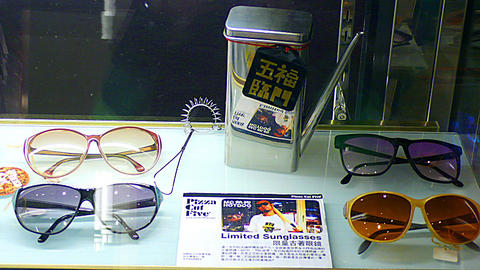
PHOTO: COURTESY OF PIZZA CUT FIVE.
Yet as any branding-savvy entrepreneur knows, a successful product needs to be tied to an idea, a story that is more identity forming than merely utilitarian.
For PCF, the story began when designer and co-founder Issa Chen (陳彥鳴), a rocker wannabe, hung around in the now-defunct live houses Skum, Human, Dog and Ant (人狗螞蟻) and later Vibe. He watched heavy bikes and metal outfit Assassins (刺客) pass and was impressed.
Enamored with the indie music and later the electronica scene, Chen was inclined to work with musicians, DJs and party-promoters. His freelance design work took an enterprising turn when his pal and now-business partner Abee Wu (吳哲祁, lead singer of bossa nova band Captain Peanut, 花生隊長), suggested he take his work out of the virtual world into the real one.
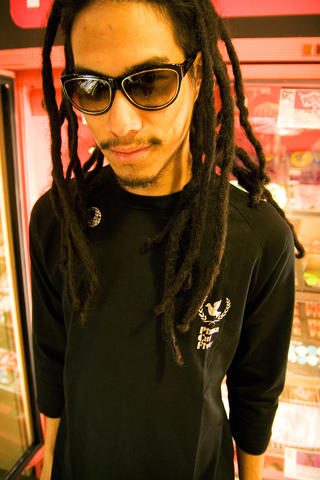
PHOTO: HO YI, TAIPEI TIMES
The problem was attracting prospective customers in such a competitive industry.
"We are too old to skateboard fast, too wimpy to do extreme cycling. We are a slothful crowd, but we all love music," said the 30-year-old designer.
With friends like KbN (凱比鳥), MC Hotdog and Sticky Rice's (糯米團) lead singer Ma Nian-xian (馬念先) acting as spokespeople and models, PCF had not only the right people to help it build a high profile, but an attractive mission statement for independent-minded fashionistas.
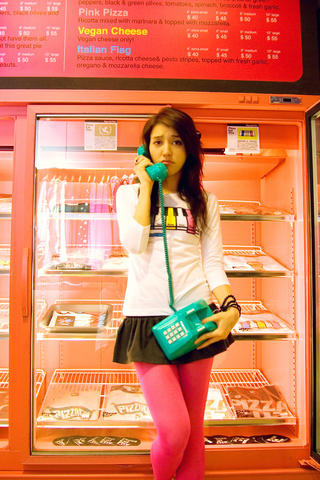
PHOTO: HO YI, TAIPEI TIMES
PCF's branding relies on nonconformity, independent thinking and the indie music spirit.
The For Friend series is based on Chen's discussions with his buddies and comrades.
"The Two Goodie shirt is inspired by my buddy 'Two Goodie' (好二)" said Chen, "He is an ABT who liked to hang out with African-Americans back in Texas. When he first came back [to Taiwan], he couldn't speak Mandarin but really dug the taike (台客) culture [a once ethnic slur that has become a badge that young Taiwanese wear with pride], which he thinks is exactly the same as black culture. So I re-imaged the icon of Darlie (黑人牙膏) with a yellow line to laud him as a black [person] under yellow skin," Chen said.
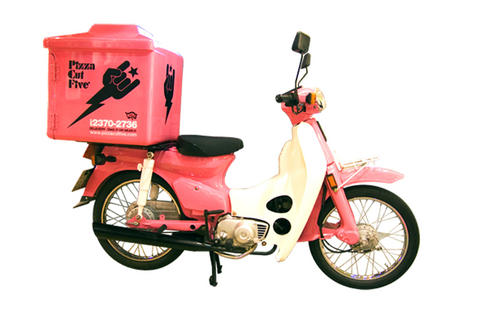
PHOTO: COURTESY OF PIZZA CUT FIVE
From shirts with guitars printed on the front for air-guitarists to microphone designs for people tired of scrambling for mics in KTVs, the PCF look is humorous and bright. Tradition also has a place among PCF's designs. The Skull series pays homage to Ghost Month (鬼月) and is part of Chen's ongoing effort to integrate tradition into trend-setting youth culture.
What influences the indie brand maker most is, however, fanwan (翻玩), parodies of pop icons or other logos or brand names, which is a common practice in street wear designs. The remixed visuals can be a tribute or mockery, recognizable to a select few, as subversive as Hello Kitty doing drugs.
"Fanwan is a way of expressing one's own ideas, whereas plagiarism is a meaningless version of the original ideas," said Chen, who parodies the Pizzicato Five's graphics, which are based on classical designs from the 1970s and 1980s.
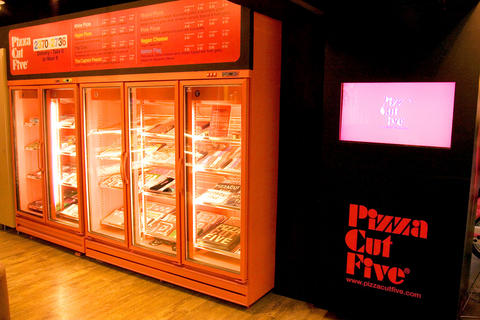
PHOTO: HO YI, TAIPEI TIMES
Though PCF ventured into Ximending just six months ago, imitators are popping up.
One of the alleged offenders is pop star Alan Luo's (羅志祥) street wear brand Stage whose designs, Chen says, are similar to PCF's.
Using graphics and designs to express his ideas instead of pens and paintbrushes, the chic product-artist will produce a fanwan series later this year. "It will be more aggressive and ridicule those who don't know how to do fanwan," Chen said.
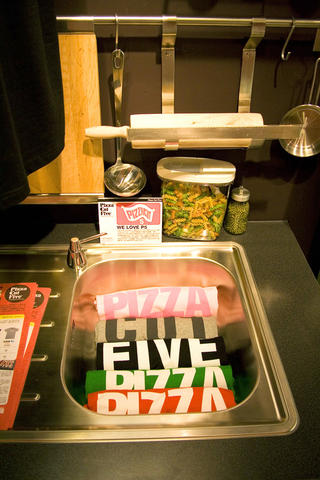
PHOTO: HO YI, TAIPEI TIMES
Pizza Cut Five is located at 116 Hanzhong St, Taipei City (台北市漢中街116號). For delivery call (02) 2370-2736.
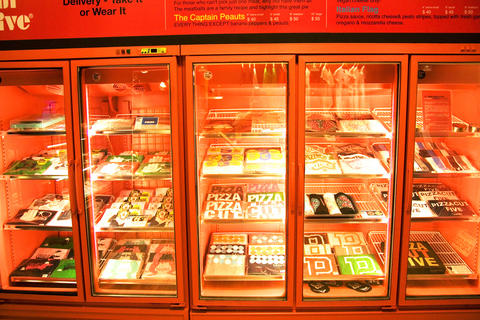
PHOTO: HO YI, TAIPEI TIMES AND COURTESY OF PIZZA CUT FIVE.

The People’s Republic of China (PRC) invaded Vietnam in 1979, following a year of increasingly tense relations between the two states. Beijing viewed Vietnam’s close relations with Soviet Russia as a threat. One of the pretexts it used was the alleged mistreatment of the ethnic Chinese in Vietnam. Tension between the ethnic Chinese and governments in Vietnam had been ongoing for decades. The French used to play off the Vietnamese against the Chinese as a divide-and-rule strategy. The Saigon government in 1956 compelled all Vietnam-born Chinese to adopt Vietnamese citizenship. It also banned them from 11 trades they had previously

Growing up in a rural, religious community in western Canada, Kyle McCarthy loved hockey, but once he came out at 19, he quit, convinced being openly gay and an active player was untenable. So the 32-year-old says he is “very surprised” by the runaway success of Heated Rivalry, a Canadian-made series about the romance between two closeted gay players in a sport that has historically made gay men feel unwelcome. Ben Baby, the 43-year-old commissioner of the Toronto Gay Hockey Association (TGHA), calls the success of the show — which has catapulted its young lead actors to stardom -- “shocking,” and says

Jan. 12 to Jan. 18 At the start of an Indigenous heritage tour of Beitou District (北投) in Taipei, I was handed a sheet of paper titled Ritual Song for the Various Peoples of Tamsui (淡水各社祭祀歌). The lyrics were in Chinese with no literal meaning, accompanied by romanized pronunciation that sounded closer to Hoklo (commonly known as Taiwanese) than any Indigenous language. The translation explained that the song offered food and drink to one’s ancestors and wished for a bountiful harvest and deer hunting season. The program moved through sites related to the Ketagalan, a collective term for the

Inside an ordinary-looking townhouse on a narrow road in central Kaohsiung, Tsai A-li (蔡阿李) raised her three children alone for 15 years. As far as the children knew, their father was away working in the US. They were kept in the dark for as long as possible by their mother, for the truth was perhaps too sad and unjust for their young minds to bear. The family home of White Terror victim Ko Chi-hua (柯旗化) is now open to the public. Admission is free and it is just a short walk from the Kaohsiung train station. Walk two blocks south along Jhongshan